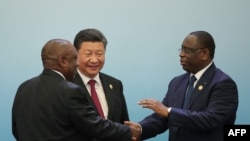At a virtual press briefing organized by Georgetown University in Washington Friday, some analysts made arguments which sought to “change the narrative” about Chinese influence in Africa.
Africa, a continent of more than 1.4 billion people, is becoming the new international geopolitical landscape as global powers compete for its attention.
Yike Fu, a policy analyst at Development Reimagined, a consultancy firm specializing in China-Africa relations in Nairobi, said between 2003 and 2021, average Chinese foreign direct investments (FDIs) in Africa, amounted to $33.8 billion per year, which is “making a big difference.”
“Chinese grants have been used to build small and medium-sized social welfare projects ... there are concessional and standard loans from China to African countries to help them to build infrastructure,” she said.
“Over the last 20 years, the total Chinese loans to Africa is $160 billion or nearly $7 billion per year. But this is actually tiny,” Fu added, noting that “our analysis estimates that African countries spent $130 billion in the last two years or $30 billion just to manage COVID-19.”
“This means that Africa needs more financing post-COVID-19 era [to support] infrastructure, agricultural and renewal energy to help the continent achieve its African Union 2063 agenda.”
Winslow Robertson, founder at Cowries and Rice, a China-Africa strategic consultancy firm, decried the misclassification of some infrastructure projects as FDIs, saying such mistakes “lead people to pull the wrong data.”
Oyintarelado Moses, a data analyst at Boston University's Global Development Policy Center, said because of Africa's “vast infrastructure gap” which the African Development Bank has said requires some $100 billion per year, China's infrastructure development loans have supported various sectors like information and communications technology, transportation, power and mining.
“The top 10 borrowers have taken 71% of this finance, and these borrowers include Angola, Zambia, Egypt, Nigeria, Kenya, and going all the way to Ghana,” she said, adding that the impact of the financing has shown “at least generally, Chinese finance leads to short term economic growth in many of these countries.”
“The negative impact is that Chinese finance projects have had a harsher impact on the environment especially for those large-scale infrastructural projects,” she said. “So, we do see benefits and risks to these finance. However, it does not negate the fact that it has contributed to the building of infrastructure which can help catalyze economic growth.”
Marina Rudyak at the University of Goettingen in Germany questioned China's claim of being a developing country “if it is giving aid.” She said the Asian economic powerhouse has been giving almost 2% of its GDP in aid, compared to industrialized countries with a target of 0.7%.
The analyst described rhetoric by Chinese officials that China-Africa relations are based on “friendship with mutual benefits” as “propaganda.”
“Critical scholars highlight the gap between rhetoric of equality and the power of symmetries in the relationship which exist, and explain specifics and diffuse reciprocity with China's ability to coerce or corrupt recipients,” she said. “This rhetoric is undoubtedly employed strategically, and there is a link with corruption that has been documented.”
The U.S. has been pushing to revitalize relations with African nations in the face of rising competition from China and Russia. Following a recent visit by U.S. Secretary of State Antony Blinken, Vice President Kamala Harris is due for a weeklong three-nation trip to Africa this weekend.






